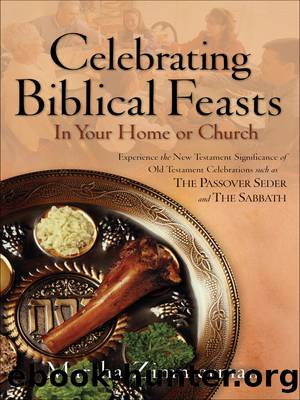Celebrating Biblical Feasts by Martha Zimmerman

Author:Martha Zimmerman
Language: eng
Format: epub
Tags: ebook, book
ISBN: 9781441211682
Publisher: Baker Publishing Group
Published: 2004-02-01T00:00:00+00:00
You shall count fifty days to the day after the seventh sabbath;
then you shall present a new grain offering to the Lord.
(Leviticus 23:16)
Chapter 3
The Omer
An âIn-Betweenâ Time
What Is the Omer? (Counting the Days)
âYou shall bring in the sheaf of the first fruits of your harvest to the priest. And he shall wave the sheaf before the Lord for you to be accepted; on the day after the sabbath the priest shall wave it. . . . You shall count fifty days to the day after the seventh sabbath; then you shall present a new grain offering to the Lordâ (Lev. 23:10â11, 16).
On the first day of the week following Passover, the cereal harvest began. The first grain to ripen of those sown in winter was the barley. An âomerâ is a half gallon of barley. The sheaf was reverently cut and the barley removed, filling a bowl. Then it was taken to the temple in this symbolic way and presented to the Lord of the harvest as an expression of thankfulness. The counting of the omer began on this day. Wheat is the last cereal to ripen, and the first fruits from this harvest are offered seven weeks later.
When the children of Israel left Egypt after the first Passover and began their journey into the wilderness, God led them to Mount Sinai. Seven weeks later He gave them a set of laws to live by that would govern their relationships with Him and with each other.
Christ died at Passover time to deliver us from the condemnation of those laws. It was obvious we could never work hard enough to earn our own righteousness. Paul wrote, âMy new life tells me to do right, but the old nature that is still inside me loves to sin. Oh, what a terrible predicament Iâm in! Who will free me from my slavery to this deadly lower nature? Thank God! It has been done by Jesus Christ our Lord. He has set me freeâ (Rom. 7:24â25, TLB).
When God offered His Son as the perfect sacrifice, He did not mean we were free to go and do as we pleased. âWell, then, if we are saved by faith, does this mean that we no longer need to obey Godâs laws? Just the opposite! In fact, only when we trust Jesus can we truly obey himâ (Rom. 3:31, TLB). âYou see, the law itself was wholly right and goodâ (Rom. 7:12, TLB). The law is goodâthe trouble is with me. âIt makes a lot of difference whether [we are] pleasing God and keeping Godâs commandmentsâ (1 Cor. 7:19, TLB). Jesus kept perfectly the law of God. He said that the evil one âhas no power over me, but I will freely do what the Father requires of me so that the world will know that I love the Fatherâ (John 14:30â31, TLB). âWhen you obey me you are living in my love, just as I obey my Father and live in his loveâ (John 15:10, TLB).
Download
This site does not store any files on its server. We only index and link to content provided by other sites. Please contact the content providers to delete copyright contents if any and email us, we'll remove relevant links or contents immediately.
| Haggadah | Hasidism |
| History | Holidays |
| Jewish Life | Kabbalah & Mysticism |
| Law | Movements |
| Prayerbooks | Sacred Writings |
| Sermons | Theology |
| Women & Judaism |
The Power of Habit by Charles Duhigg(3121)
Man's Search for Meaning by Viktor E. Frankl(2664)
Mckeown, Greg - Essentialism: The Disciplined Pursuit of Less by Mckeown Greg(2414)
MOSES THE EGYPTIAN by Jan Assmann(2411)
Devil, The by Almond Philip C(2324)
The Complete Dead Sea Scrolls in English (7th Edition) (Penguin Classics) by Geza Vermes(2269)
Unbound by Arlene Stein(2267)
I Capture the Castle by Dodie Smith(2032)
Schindler's Ark by Thomas Keneally(1875)
The Invisible Wall by Harry Bernstein(1799)
The Gnostic Gospel of St. Thomas by Tau Malachi(1781)
The Bible Doesn't Say That by Dr. Joel M. Hoffman(1676)
The Secret Doctrine of the Kabbalah by Leonora Leet(1601)
Political Theology by Carl Schmitt(1571)
The Jewish State by Theodor Herzl(1527)
A History of the Jews by Max I. Dimont(1520)
The Dead Sea Scrolls Bible by Martin G. Abegg(1502)
The Book of Separation by Tova Mirvis(1480)
Oy!: The Ultimate Book of Jewish Jokes by David Minkoff(1360)
